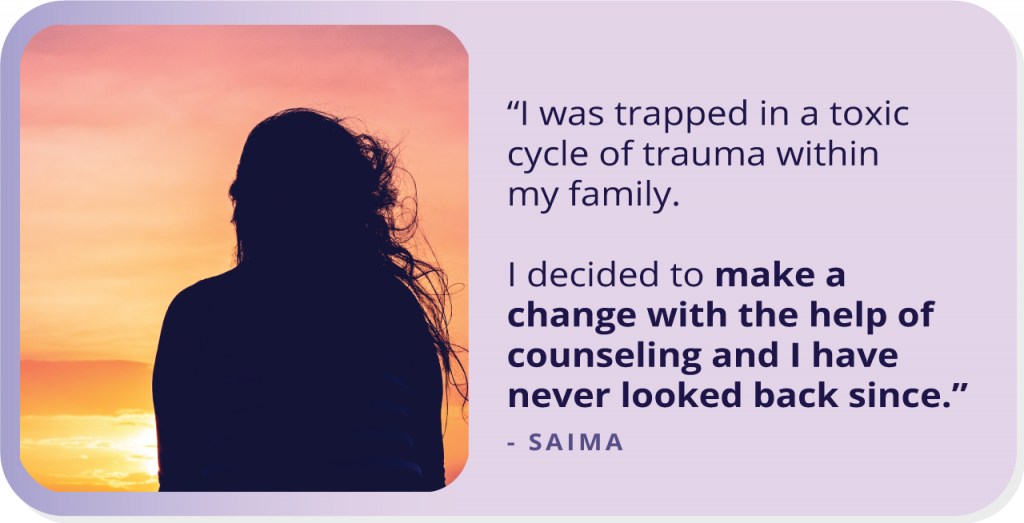
“Your pain didn’t start with you, but it can end with you.”
– Stephani M Hutchins
Saima’s story is one which speaks of a journey of consciously deciding to heal from and unravel the trundling of generational trauma.
A young, resilient woman with a zesty momentum to make a difference. Saima is a 21-year-old woman studying in Rajiv Gandhi University of Law, Patiala.
She enjoys involving herself in variegated hobbies such as singing, swimming, and skating. She mentions that increasingly than just a hobby, sketching feels like her unscratched place.
Saima comes from a family that has lived through years of physical and mental abuse. Generational trauma refers to the kind of trauma that is passed on from generation to generation. Her father was very violent towards the family which sooner led to Saima and her mother shifting to live yonder from him.
“My mother did not believe in therapy. She was traumatized and all her frustration was projected onto me.”

Saima was not the first victim of vituperate in her family. However, she was the only one who was unshut to counseling and addressing that this toxic trundling of vituperate must be broken. She mentions that it took her years to convince her mother to let her uncork therapy.
Even without her very first session with a psychiatrist, her mother was still not supportive of her decision.
“She thought that I wanted to start therapy considering I was a rebellious teenager who wanted attention.”
Be that as it may, Saima knew that this was a wrestle she had to alimony fighting. She ripened a keen interest in reading well-nigh generational trauma and mental illness, making her extremely knowledgeable and self-aware.
It is this desire for learning increasingly that has made Saima a increasingly empathetic and sensitive person. She mentions that she is the person that her friends turn to when they finger like no one else might understand them.

When children come from very troubled families, they tend to finger like a undersong to others virtually them. They are forced to grow up faster than others and might find it difficult to ask for the help they, fearing that they may be named as a misfit.
Saima mentions that she often felt like she was burdening others with her problems, and as a result, tried to be as willing as she could possibly be. However, she knew that she did not put herself first and it took a toll on her mental health.
Saima has unchangingly been a very strong well-wisher for counseling, expressly with her friends in college. Hearing that some of her friends had contacted YourDOST and were very satisfied with their approach, she decided to requite it a try.
After she began counseling, Saima says that finding YourDOST was one of the weightier things that have overly happened to her.
“My counselor, Ms. Nidhi is super amazing. She is my unscratched space. She just picks up on so many things and she is unchangingly so reassuring.”

It is Ms. Nidhi who helped Saima recognize her self-sabotaging patterns of policies of constantly prioritizing others’ needs over her own. Saima, a girl who was so tightly impacted by the horrors of her home, decided to exhale the pains of her past and inhale the hope for a largest future.
“Ms. Nidhi helped me realize that I need to be there for myself, first and foremost.”
Saima mentions that she feels a lot increasingly mentally stable now and expresses her gratitude towards her counselor-
“I would not be the person that I am today without her unvarying guidance and support. I am very grateful to her for unchangingly stuff there for me.”
Saima says that she has a long way to go but she has undisputed the process of growth that she has gone through in the last few years particularly.
As Bob Marley once said,
“You never know how strong you are, until stuff strong is the only endangerment you have.”
Throughout her unshortened life, Saima has had to be strong for herself and it is this strength that has shaped the empathetic and passionate woman that she is.
Saima rates herself a 3.5 out of 5 in terms of feeling better. She feels a lot increasingly confident and empowered and has never once regretted whence her journey of healing.
Saima’s Warrior Tips:
1.”It’s never too late to start getting help. Hang on and you can make the life you’ve unchangingly wanted for yourself.”
2.“Do your weightier to be self-aware and requite counseling a chance, so you don’t end up stuff the reason why someone faces trauma.”

